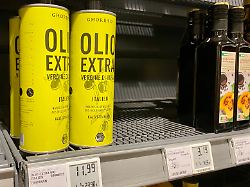Empty shelves after price explosion
Olive oil is becoming scarce in supermarkets
February 9, 2024, 12:21 p.m
Customers in Germany rely on quality when it comes to olive oil. This drives up prices even further – and, in addition to crop failures, increasingly empties supermarket shelves. In addition, a price war is apparently raging in retail here too.
Olive oil is becoming scarce in German supermarkets, as the “Lebensmittel Zeitung” (LZ) reports. The range has currently shrunk significantly at Rewe, Kaufland, Penny, Aldi Süd, DM and Alnatura, among others. The gaps on the shelves can be traced back to two reasons: According to insiders, some manufacturers are not able to deliver, and some retailers do not accept their price demands.
Olive oil prices have been going through the roof for six months; in January they were 46 percent higher than the previous year. Crop failures due to drought in southern Europe are to blame. 500 milliliters from the brand market leader in Germany, Bertolli, now costs 9.99 euros even at discounters – four years ago it was half as much, as the LZ calculates.
There is no end to the price increase in sight. According to industry experts, manufacturers have not yet fully passed on significant cost increases for raw materials. “Prices will continue to rise in the first half of 2024,” the trade journal quotes the Northern European boss of the Spanish Bertolli parent company Deoleo, Tomislav Bucic. “For the olive oil category, times are currently more challenging than ever before.” Bertolli is at least able to deliver across the board.
Soon more than 12.50 euros per liter
“In the last two months alone, according to Nielsen market research, prices for olive oil in stores have risen by around 2.60 euros per liter, but the prices of the raw material have risen by 4 euros per liter,” reports Bucic. LZ Kenner quotes that consumer prices of 10 euros per liter will soon no longer be sustainable. Even cheap oils would soon cost significantly more than 12.50 euros per liter.
On the one hand, Bucic attributes the gaps in the shelves to the high demands in Germany. Since only high quality is accepted, the selection is limited. On the other hand, in his opinion, raw material buyers have gambled away. They overestimated the harvest that began in autumn. Anyone who waited for prices to fall ultimately had to pay more.
In view of the price explosion, it is not surprising that, according to Spanish press reports, Deoleo’s main owner CVC Capital Partners has not found any interested parties for its Deoleo shares. According to LZ, the Spaniards are already arming themselves against the consequences of climate change in the traditional producing countries of southern Europe, for example through new sources of supply such as South Africa or South America. But the high prices cost sales: Despite the increased end customer prices, according to the report, Deoleo’s sales in the first half of last year were 22 percent below the same period last year, resulting in a loss of 9.7 million euros.
In times of crisis, customers rely on what they know
In Germany, however, Spanish sales suffer relatively little. “During a crisis, consumers who can afford it are particularly keen to use brands they know,” says Bucic. However, Bertolli is also feeling the losses due to declining promotional business.
Despite the increased production costs, the trade rejects the manufacturers’ price expectations, and not just for olive oil. The price war between Edeka and the US food giant Mars has just come to an end – after a year and a half.
